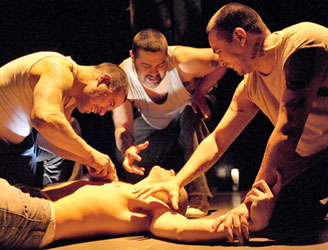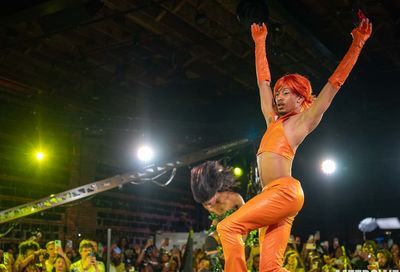Oedipal Rush
With a street poet's ear for the music of language, Luis Alfaro brings an urban vibe to the ancient tragic tale
Flowing with the rhythm and energy of well-tuned invective, Luis Alfaro’s Oedipus el Rey brings an urban vibe to Sophocles’ ancient and tragic tale of the man who can’t escape his fate. Set in modern day Los Angeles, this is a Chicano Oedipus with attitude who’s come of age in juvenile detention centers and prison. When his latest stint behind bars ends, he returns to the barrio of his birth determined to make something of himself. But even as he ascends the neighborhood’s hierarchy, the will of the Gods is silently and inexorably being done.

Oedipus el Rey
(Photo by Stan Barouh)
Alfaro has a street poet’s ear for the music of language, whether English or Spanish. Bringing fresh authenticity to the posturing culture of the young Chicanos, he blithely ignores much of the color-by-numbers dialogue and interactions we see so often elsewhere. Even when the play closely tracts the original, this is never simply Oedipus the King with Latin accents. This is Alfaro searching for something endemic in the struggle of a young Chicano male trying to find himself among his own; how deeply he wants to connect and yet how easily he is able to destroy.
Although some of the ideas could have been transmitted with greater clarity, what does come through loud, clear and with impact is the sense that, for many young men, even the basic urge to respect oneself and find happiness cannot always survive in a community in which control has supplanted hope and opportunity.
Unfortunately, despite Alfaro’s potent concept, director Michael John Garces has not brought his players to the cohesion this Oedipus requires. Though we sense the rhythm Alfaro seeks from the intermittent chanting and commentary of the Coro — or chorus — these moments, though energetic and woven with evocative sound and music, lack color. Without this binding force, the play loses some of its momentum.
Similarly, Garces has not drawn all the players into a unified vision of this place and time. Although David Anzuelo gives his Laius, Oedipus’s biological father, a compelling intensity, his demeanor does not suggest the kind of leader he must have been to head a barrio. As Creon, Jocasta’s suspicious brother, Jose Joaquin Perez offers charisma, but his machismo is over-played to the point of distraction.
These shortcomings aside, the cornerstone performances here are strong and interesting. As Oedipus, Andres Munar delivers a carefully crafted presence, one that is at times completely commanding of our attention and at others, understated to the point of unassuming. When engaged, Munar brings a highly effective, disarming realism to his Oedipus. The character never feels contrived. In the scene in which he first meets Jocasta and begins to woo her, his need to understand her is palpable and original. As Jocasta, Romi Dias makes for a convincingly wounded but enduring matriarch. Her initial resistance to Oedipus and then the softening that comes as she begins to be heard and understood is artfully rendered. Although their chemistry cannot be described as searing, the emotional connection these actors generate rings very true.


 AND ONE HALF
AND ONE HALFTo 3/6
Woolly Mammoth
641 D St. NW
$30-$65
202-393-3939
woollymammoth.net
What works far less well is the shedding of their clothes. The employment of nudity, especially the sexual kind, is a risky proposition in live theater. Unless handled with the utmost care, it is bound to break the fiction. Here, unfortunately, the actors simply cannot maintain their wonderfully crafted emotional connection through the complex choreography necessitated by the choice. And even if such nakedness is symbolic (of their biological connection or their emotional need), there is no denying it has to be sexual as well – it is, after all, part and parcel of the horror and pathos to come. But with the constraints of full nudity we lose the sexual quotient — the actors barely touch. Was the breaking of a finely wrought piece of suspended disbelief worth it? Not at all. Unless, of course, you’re sitting in the front row.
The other downside to nudity is the reality that it may crowd-out the far harder-won achievements of a play. Even flawed, this production gives a striking contemporary voice to an ancient tale and, on that alone, it resonates.
Support Metro Weekly’s Journalism
These are challenging times for news organizations. And yet it’s crucial we stay active and provide vital resources and information to both our local readers and the world. So won’t you please take a moment and consider supporting Metro Weekly with a membership? For as little as $5 a month, you can help ensure Metro Weekly magazine and MetroWeekly.com remain free, viable resources as we provide the best, most diverse, culturally-resonant LGBTQ coverage in both the D.C. region and around the world. Memberships come with exclusive perks and discounts, your own personal digital delivery of each week’s magazine (and an archive), access to our Member's Lounge when it launches this fall, and exclusive members-only items like Metro Weekly Membership Mugs and Tote Bags! Check out all our membership levels here and please join us today!































